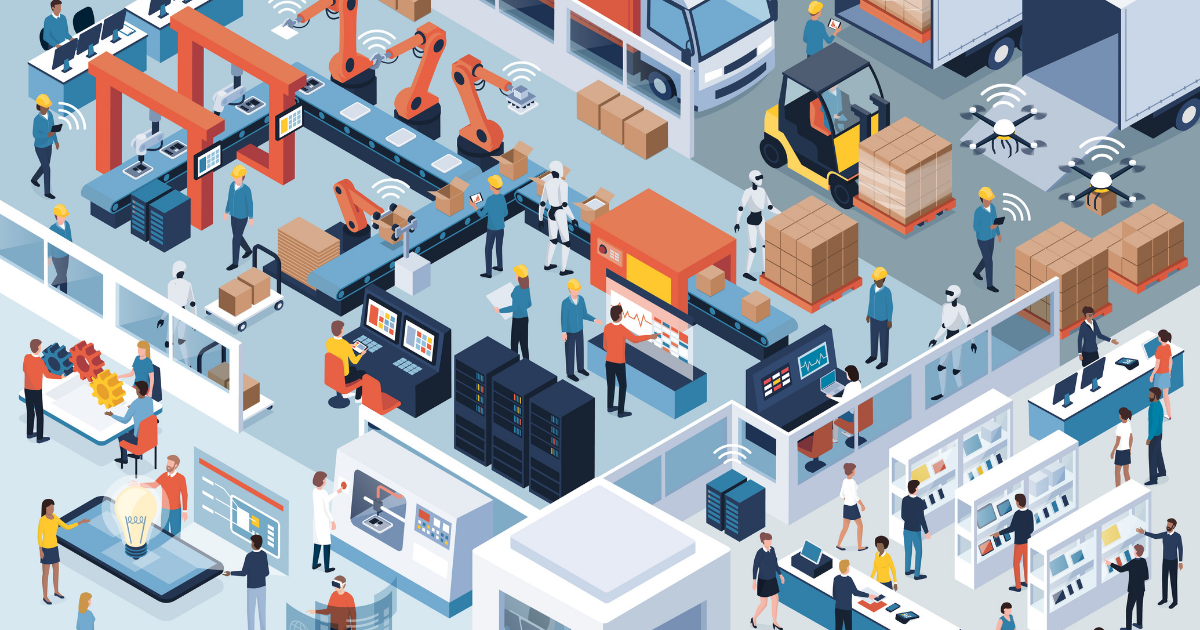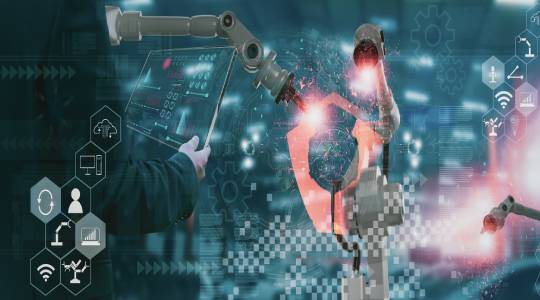The 4th industrial revolution or Industry 4.0 as we know it today is becoming a mainstream entity worldwide. Manufactures and heavy industrial organizations are rapidly embracing technology innovations to achieve goals such as improved productivity, guaranteed sustainability, lower costs, and better compliance to regulatory frameworks and policies.
Studies estimate that the Industry 4.0 market size globally will grow to a phenomenal USD 165.5 billion by 2026. Key drivers of the trend include rapid adoption of emerging technological innovations like 3D Printing, Artificial Intelligence (AI), Industrial Internet of Things (IIoT), Blockchain, Edge Computing, and a host of traditional computing innovations like big data analytics, AR/VR, sensors, and the cloud.
Industrial establishments are transitioning into highly autonomous smart manufacturing hubs that leverage advanced collaboration between machines and staff to ensure a better working environment for all stakeholders. While technology solutions and innovations will be at the driving seat of pushing Industry 4.0 adoption in more business scenarios for manufacturers, the real challenge is to make industrial organizations aligned and ready to embrace the change.
The question for most industrial leaders is how to rethink their organization’s processes and structure to maximize the ROI from their Industry 4.0 initiatives. Let us have a look at four key requirements that manufacturing and industrial companies must fulfill to embrace Industry 4.0 and maximize outcomes:
Define Goals and Objectives
While Industry 4.0 has a lot to offer for manufacturers, every business has its own unique DNA that needs attention while being subjected to a transformational experience like taking a jump into Industry 4.0. To avoid pitfalls and unending reengineering efforts, it is important to first identify and list out the goals and objectives that your business aims to achieve through the transition into Industry 4.0 readiness. It could be any single one, or a combination of outcomes like fastening production cycle time, improving staff productivity, lowering costs, better equipment lifecycle/maintenance, eliminating downtimes, etc. Once the goals have been determined, then it becomes easier to work around them and prioritize initiatives to achieve modular improvements and re-configurations of your business components that make the road easier to reach the goal. Processes can be remodeled to suit new workflows that came in as a result of technical or functional changes brought about to realize goals or goal components.
Evaluate Success in Pilot Programs
Rather than going for an all-out implementation that drastically impacts all business processes and workflows, Industry 4.0 technology rollout initiatives need to be formulated as incremental changes and kick started on a smaller scale involving fewer areas. Results and feedback learned from these pilot programs can be used as a base for subsequent program expansion initiatives. This can also help reduce reworks or disruptive events that may occur if the transition happened with flaws on a larger scale. It becomes easier for different stakeholders to study the impact in their respective departments or business processes and implement changes and take measures to solve roadblocks. This, thereby, guarantees better cohesiveness when different departmental innovations in Industry 4.0 frameworks are integrated over time to realize the full potential of the initiative.
Inclusive Business Process Re-engineering
While re-engineering key business processes and workflows, the focus should be on empowering the existing workforce to become more productive, reduce biased decisions, and achieve better output with the same effort they put in before. Industry 4.0 frameworks make the factory floor smarter, but they still need human resources who now have a whole new arsenal of tools and insights to bring out their best. When machines and humans can co-exist in harmony, Industry 4.0 realizes its true potential faster rather than being kept under apprehensive prejudices.
Become Data-Driven
The digital economy needs data as its fundamental building block. Industry 4.0, being a part of this digital journey, is no exception. Manufacturers need to ensure that their existing technology systems, processes, and workflows can generate data relevant to their operational ecosystem. Industry 4.0 frameworks and technology rely heavily on leveraging data from across processes and departments to iron out inefficiencies, discover new value paths, create new revenue streams, and enable better operational collaboration between different units in an industrial or manufacturing establishment. From connected machinery to sensors from wearable for field staff, there is a gamut of data that needs to be processed and analyzed to maximize outcomes from Industry 4.0 implementations.
Industry 4.0 will be one of the most pivotal leaps that mankind makes in terms of enabling a better working world. The level of autonomy and intelligence that the industrial sector can achieve will directly impact the way future technology innovations can reach consumers faster and this includes products ranging from Smartphone to self-driving cars.
Getting into the Industry 4.0 bandwagon is not a simple endeavor. It requires a strategic roadmap with a clear idea of best practices to be followed for better ROI. Get in touch with us to explore how your manufacturing business can become smarter and Industry 4.0 enabled with zero risks.



